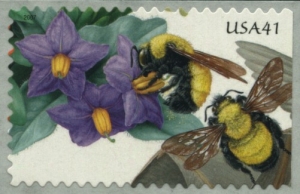A major bee conservation group in Scotland has become embroiled in a bitter row for failing to back a ban on nicotine-based pesticides blamed for killing bees. The Bumblebee Conservation Trust, based at the University of Stirling, is facing calls for the resignation of its newly-appointed chairman, Professor Michael Usher, and criticism from its founder over its cautious stance. One reason the trust has refused to support a ban is revealed in a paper agreed at the last meeting of trustees in May. "If we take an aggressive campaigning stance then we risk reputational/ relationship damage with government and, importantly, with farmers," it said.
Usher, formerly chief scientist at the Government wildlife agency Scottish Natural Heritage, was recently quoted in a gardening magazine defending the use of neonicotinoids. This has infuriated beekeepers and campaigners, who are now demanding he resign or be sacked from the bumblebee trust. In a letter to the Sunday Herald published today, two of the trust's life members and two activists from the campaign group Friends of the Bees, have warned that wildlife is facing "ecological Armageddon". If the trust fails to back a ban, it "may find its membership sliding towards extinction faster than the bumblebees", they said. The Bumblebee Conservation Trust has also come under fire from Professor Dave Goulson, a bee expert from the University of Stirling who originally founded the trust.
He published research in March showing that bumblebees fed a neonicotinoid suffered an 85% loss in the number of queens in their colonies. "I don't understand the trust's position," Goulson told the Sunday Herald. He said it had not discussed its stance with him, and he did not think Usher's remarks were founded on any specialist knowledge. "There is now considerable evidence that neonicotinoids do have an impact on both honeybees and bumblebees, so it seems anomalous for a bee conservation charity to be stating that these compounds are necessary," he said. The bumblebee trust defended Usher, claiming that his remarks had been misrepresented.
Its chief executive, Ben Darvill, said: "We neither back the continued use of neonicotinoids, nor do we call for an immediate ban. We call for an immediate review to determine the crop protection solution which has the minimum impact on pollinators and other beneficial insects."
One problem was that farmers deprived of the pesticides might use something worse, Darvill argued. He said: "The trust recognises the need for agricultural chemicals in some farming systems. However, we are understandably concerned these crop protection chemicals may be harming the pollinator populations which many flowering crops need to ensure an optimum yield." The Crop Protection Association, which represents pesticide companies, dismissed studies suggesting that neonicotinoids harmed bees as "unrealistic". An association spokeswoman said: "Our industry is actively involved in working with all stakeholders, including beekeepers, farmers and the scientific community, to gain a better understanding of the science surrounding poor bee health."
Source: Sunday Herald, 29 July 2012
http://www.heraldscotland.com/comment/letters/stinging-rebuke-for-bee-c…

- Login om te reageren
